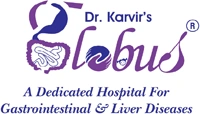Eating Disorders: Anorexia, Bulimia, Binge Eating, and More
What Are Eating Disorders?
Eating disorders are complex socio psychological issues that go beyond food, deeply affecting both mental and physical health. These disorders are highly prevalent, affecting individuals of all ages and backgrounds. At Globus Gastro Liver Hospital, we often encounter patients with various eating problems that, upon evaluation, are diagnosed as eating disorders. Understanding these disorders is the first step in recognizing their impact and seeking appropriate treatment.

What Causes Eating Disorders?
Eating disorders can be triggered by a combination of factors, including:
- Disturbed Brain Biology: Abnormalities in brain chemistry can contribute to the development of eating disorders, affecting how individuals perceive hunger, fullness, and body image.
- Cultural Pressures: Societal ideals and unrealistic beauty standards can lead to an unhealthy relationship with food and body image, particularly in adolescents.
- Personality Traits: Traits such as perfectionism, low self-esteem, and anxiety are often linked to eating disorders, making individuals more susceptible to these conditions.
- Genetic Factors: A family history of eating disorders may increase the likelihood of developing these conditions, suggesting a genetic predisposition.
What are the Types of Eating Disorders?
There are several types of eating disorders, each with its own set of characteristics:
- Anorexia Nervosa: Characterized by extreme food restriction, intense fear of gaining weight, and a distorted body image, leading to severe underweight.
- Bulimia Nervosa: Involves cycles of binge eating followed by purging behaviors such as vomiting, using laxatives, or excessive exercise to prevent weight gain.
- Binge Eating Disorder: Marked by episodes of consuming large quantities of food in a short period without purging, often leading to obesity and related health issues.
- Pica: Involves the consumption of non-edible items such as soil, chalk, ice, or hair, leading to serious health risks including nutritional deficiencies and digestive issues.
- Rumination Disorder: Characterized by regurgitating food that has been swallowed, re-chewing it, and either re-swallowing or spitting it out.
- Avoidant/Restrictive Food Intake Disorder (ARFID): Common in children, ARFID involves avoiding certain foods due to sensory issues, leading to nutritional deficiencies.
What are the Symptoms of Eating Disorders?
The symptoms of eating disorders vary depending on the type but generally include the following:
- Physical Symptoms: Significant weight loss or gain, fatigue, dizziness, gastrointestinal problems, and dental issues (especially in bulimia nervosa).
- Behavioral Symptoms: Obsessive focus on food, dieting, and body weight; withdrawal from social activities; and extreme measures to control weight, such as fasting, excessive exercise, or purging.
- Emotional Symptoms: Anxiety, depression, low self-esteem, guilt, and a distorted body image.
Recognizing these symptoms early is crucial for effective diagnosis and treatment.
How are Eating Disorders Treated?
At Globus Gastro Liver Hospital, treatment for eating disorders is approached with a strong focus on gastrointestinal health, as these disorders can significantly impact the digestive system. Our treatment strategy includes:
Medical Care and Monitoring: We address immediate gastrointestinal health concerns, such as malnutrition, electrolyte imbalances, and digestive complications that often accompany eating disorders.
Nutritional Counseling: Our team provides personalized nutritional counseling to help patients develop healthier eating habits and ensure they receive the necessary nutrients to support recovery.
Psychotherapy: While we focus on the physical aspects, we collaborate closely with psychologists and psychiatrists to address the underlying psychological issues through cognitive-behavioral therapy (CBT) and other therapeutic approaches.
Medications: If necessary, we manage any gastrointestinal symptoms with appropriate medications and may also coordinate care for antidepressants or other medications to manage associated mental health conditions.
Follow-Up: Regular follow-up is encouraged to maintain progress and prevent relapse.
Early intervention is essential in preventing long-term gastrointestinal and overall health complications and improving the quality of life for individuals with eating disorders. Eating disorders are serious and complex conditions that require timely and comprehensive treatment. At Globus Gastro Liver Hospital, led by Dr. Vedant Karvir, we specialize in addressing the gastrointestinal aspects of these disorders, ensuring that patients receive good care that addresses both physical and psychological needs. Schedule an appointment with Dr. Vedant Karvir, top gastroenterologist at Globus Gastro Liver Hospital today, took the first step towards recovery and better health.
Others Condition:
Bloating | Cancers of Stomach, Intestine & Liver | Constipation | Hirshsprung’s Disease | Gallstone | Dysphagia | Inflammatory Bowel Disease | Pancreatitis | SIBO | Barrett’s Esophagus | Blood in Stools / Vomitus | Celiac Disease | Diarrhea | Fatty Liver | Gerd | Irritable Bowel Syndrome | Piles



